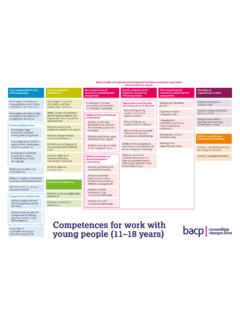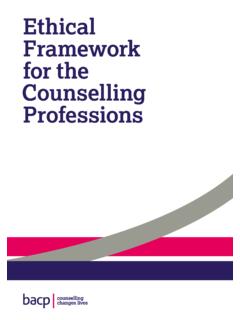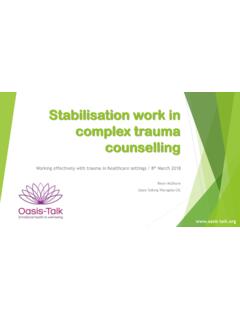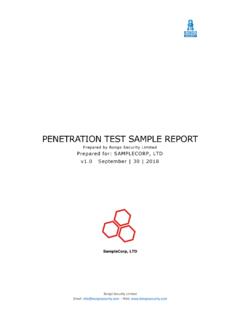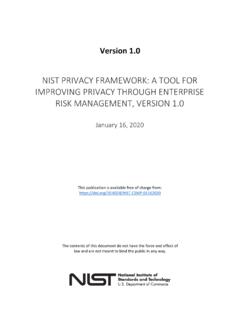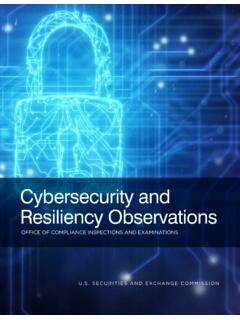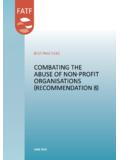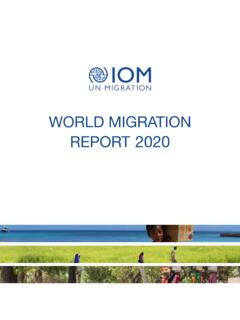Transcription of Online and phone therapy (OPT) competence framework
1 Online and phone therapy (OPT) competence frameworkOnline and phone therapy (OPT) competence frameworkCopyright information: Online and phone therapy (OPT) competence framework is published by the British Association for Counselling and Psychotherapy, BACP House, 15 St John s Business Park, Lutterworth, Leicestershire, LE17 4HB. T: 01455 883300 F: 01455 550243 E: is the largest professional organisation for counselling and psychotherapy in the UK, is a company limited by guarantee 2175320 in England and Wales, and a registered charity, 298361. Copyright 2021 British Association for Counselling and Psychotherapy. All rights reserved. Design by Steers McGillan Eves. Online and phone therapy (OPT) competence framework2 Online and phone therapy (OPT) frameworkCompetence Knowledge1 Knowledge of the different ways of offering OPT and of the associated technologies2 Knowledge of the benefits and constraints of OPTP rofessional competences3 Knowledge of, and ability to operate within, legal, professional and ethical guidelines when offering OPT4 Knowledge of, and ability to work with, issues of confidentiality and consent, including data protection, GDPR and ability to monitor own digital footprint and that of the clinical work5 Ability to negotiate a contract for OPT6 Ability to recognise, acknowledge and respond to issues of equality, diversity, and inclusion pertinent to OPT7 Ability to make use of appropriate supervision for OPT8 Ability to work internationallyOnline and phone therapy (OPT)
2 competence framework3 competence Therapeutic competences9 Ability to use effective language and communication processes specific to OPT10 Ability to work remotely with psychological processes11 Ability to manage endings for OPT12 Knowledge of and response to practitioner self-care and well-being related to OPTA ssessment, planning and referral13 Ability to assess suitability for OPT14 Ability to identify, assess, acknowledge and respond to existing and/or emerging risk during OPT15 Knowledge of referral and signposting pathwaysMeta-competences16 Assessment17 Risk18 Adjusting the intervention to the individual when providing OPTO nline and phone therapy (OPT) competence framework4 Knowledge1 Knowledge of the different ways of offering OPT and the associated technologies i. Knowledge of and ability to assess current technology appropriate for the practitioners modality /theoretical orientation and the client s Knowledge of how different technologies are set up and Ability to reflect on own skills in using technology and devices.
3 Drawing on the knowledge that adequate technological knowledge and understanding of levels of security is needed before engaging in Ability to reflect on own attitudes and preferences related to Ability to offer appropriate interventions and techniques specific to Online video therapy : In the context of reduced visual cues ( view of head/shoulders only), paying increased attention to posture / gesture / tone of voice / silences In recognition of different communication medium: Checking out any uncertainty in communication Negotiating ways to come in without talking over client Using more frequent non-verbal encouragers to ensure the client knows you are there and listening Being mindful of the impact of any time lags in communication Being aware of how challenge might be received at a distance5 Online and phone therapy (OPT) competence frameworkKnowledgevi.
4 Ability to offer appropriate interventions and techniques specific to phone therapy : Acknowledging the impact of the lack of visual cues In absence of visual cues, paying increased attention to what is suggested by tone of voice and silences Offering more frequent encouragers to let the client know you are there and listening Acknowledging and normalising that without visual contact, talking over each other occurs occasionally Checking understanding with reflective responses and keeping them brief Being aware of how challenge is received without visual contact and at a distancevii. Ability to offer appropriate interventions and techniques specific to text based therapy (synchronous and asynchronous) : Acknowledging that the written word can differ from the spoken word the meaning cannot be moderated by contextual features (such as non-verbal communication), it can have a sense of permanence Adapting the style of communication to best fit different mediums ( email versus instant messaging) Writing in a manner that is professional but informal enough to engage the client, acknowledging that the use of certain informal styles may undermine the client s confidence in the practitioner Promoting a sense of consistency and trust by maintaining a consistent style of writing Drawing on knowledge of norms commonly associated with written communication specific to the medium used (netiquette, norms of texts differ from email)
5 Understanding that shifts in the client s style of written communication could be indicative of psychological and emotional changes Recognising the additional challenges presented by the fact that that synchronous written communication requires instant and spontaneous responses and the capacity to infer a client s emotional state from their style and pace of responding Responding to and managing crossed communications in instant messaging6 Online and phone therapy (OPT) competence frameworkKnowledgeviii. Acknowledgement of the role of text-based communication in all forms of OPT by: Maintaining professionalism and boundaries in all correspondence; this includes administrative correspondence that sits outside of the actual OPT session Acknowledging that administrative text-based communication may be the first contact with any client, regardless of the method of communication going forward an email may be the first contact for audio and visual therapy sessionsix.
6 Ability to offer a blended approach to therapy by: Being flexible to any changing needs of the client where possible and when working in a different medium is within the practitioner s competence Assessing client suitability for a blend of therapy ( moving from one medium to another, Online and phone / Online and in the room / phone and in the room) Ascertaining the reasons which will determine a move from one medium to another Ensuring the blend of therapy remains in the client s best interest2 Knowledge of the benefits and limitations of OPT i. Knowledge of and ability to discuss with the client the potential benefits of OPT : Accessibility for those with certain disabilities, limited transport options, or distance, the client can stay at home Flexibility , can fit around client s life choices Being in separate locations may feel less inhibiting The remote nature of the work has the potential for alleviating client circumstance isolation Asynchronous communication can allow time for reflection and consideration and is not constrained within a more structured session7 Online and phone therapy (OPT) competence frameworkKnowledgeii.
7 Knowledge of and ability to discuss with the client the potential limitations of OPT : Potential technical issues Data security Lack of visual contact in some approaches may reduce non-verbal communication which might impact on mutual understanding Written communication might be experienced as lacking spontaneity Ability to consider whether the remote nature of the work has the potential for exacerbating client circumstance ( isolation) Uncontracted gaps between text based messages could be challenging for some clients The written word can sometimes be misunderstoodiii. Ability to acknowledge and incorporate into practice, knowledge of the ways OPT differs from face to face work : How to manage not being physically present to assist in times of emergency Assessment and contracting processes might be different (questionnaires, assessment questions, how a contract is agreed, payment for sessions) Managing time boundaries and the lack of transition for clients at the start and end of a session8 Online and phone therapy (OPT) competence frameworkKnowledgeProfessional competences3 Knowledge of, and ability to operate within, legal, professional and ethical guidelines when offering OPT i.
8 Knowledge of and ability to identify, respond to and resolve legal and ethical Ability to assess and monitor own level of competence in relation to Ability to commit to identifying gaps in own competence and engage with appropriate training and CPD to ensure knowledge and practice is up to date and relevant for safe and effective and phone therapy (OPT) competence frameworkProfessional competencesiv. Knowledge of and ability to set up an OPT therapeutic frame and conduct therapeutic work appropriately, : Facilitating the client s establishment of a consistent, secure and confidential location and context and appropriate boundaries for OPT sessions Offering an appropriate visual environment for working on digital platforms, being mindful of what the client can see ( inappropriate self-revelation) Guiding clients to manage effectively their own technological security and privacy Exploring any changes in location with the clientv.
9 An ability to draw on knowledge that legal and ethical issues differ between working with adults and children and therefore take reasonable steps to confirm the legal age and legal identity of the client. 4 Knowledge of, and ability to work with, issues of confidentiality and consent, including data protection (GDPR) and ability to monitor own digital footprint and that of the clinical worki. Knowledge of GDPR legislation and how data applies to different mediums for OPT : ICO requirements Reporting data breaches Using own technology when working for organisations and agencies Ensuring there is a legal basis to process personal data Working within agency policies regarding data security for OPT10 Online and phone therapy (OPT) competence frameworkProfessional competencesii. Knowledge of and ability to discuss issues of confidentiality and data protection related to OPT, including.
10 Limits to confidentiality when working remotely Being able to inform the client of how to achieve safety in relation to data protection, platforms and equipment Knowledge of up to date digital platforms and technology and the related limitations of security in relation to OPT Maintaining client safety and confidentiality in relation to data protection and technology Understanding and implementing the practitioner s responsibility to manage and monitor their own digital footprint and that of the clinical work Negotiating careful agreement concerning any recording of sessions by either practitioner or client and being able to communicate the implications of any such recording being made Discussing data security and privacy in relation to OPT and the client s circumstances and possible vulnerabilities5 Ability to negotiate a contract for OPTi.

